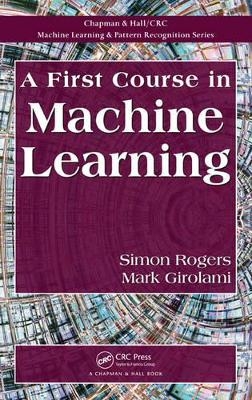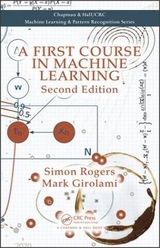
A First Course in Machine Learning
Taylor & Francis Inc
978-1-4398-2414-6 (ISBN)
- Titel erscheint in neuer Auflage
- Artikel merken
Referenced throughout the text and available on a supporting website (http://bit.ly/firstcourseml), an extensive collection of MATLAB®/Octave scripts enables students to recreate plots that appear in the book and investigate changing model specifications and parameter values. By experimenting with the various algorithms and concepts, students see how an abstract set of equations can be used to solve real problems.
Requiring minimal mathematical prerequisites, the classroom-tested material in this text offers a concise, accessible introduction to machine learning. It provides students with the knowledge and confidence to explore the machine learning literature and research specific methods in more detail.
Simon Rogers is a lecturer in the School of Computing Science at the University of Glasgow, where he teaches a masters-level machine learning course on which this book is based. Dr. Rogers is an active researcher in machine learning, particularly applied to problems in computational biology. His research interests include the analysis of metabolomic data and the application of probabilistic machine learning techniques in the field of human−computer interaction. Mark Girolami is a chair of statistics and an honorary professor of computer science at University College London, where he is also the director of the Centre for Computational Statistics and Machine Learning. An EPSRC Advanced Research Fellow, an IET Fellow, and a Fellow of the Royal Society of Edinburgh, Dr. Girolami has made major contributions to the field, including his generalisation of independent component analysis, his work on inference in systems biology, and his innovations in statistical methodology.
Linear Modelling: A Least Squares Approach
Linear modelling
Making predictions
Vector/matrix notation
Nonlinear response from a linear model
Generalisation and over-fitting
Regularised least squares
Linear Modelling: A Maximum Likelihood Approach
Errors as noise
Random variables and probability
Popular discrete distributions
Continuous random variables — density functions
Popular continuous density functions
Thinking generatively
Likelihood
The bias-variance tradeoff
Effect of noise on parameter estimates
Variability in predictions
The Bayesian Approach to Machine Learning
A coin game
The exact posterior
The three scenarios
Marginal likelihoods
Hyper-parameters
Graphical models
A Bayesian treatment of the Olympics 100 m data
Marginal likelihood for polynomial model order selection
Summary
Bayesian Inference
Nonconjugate models
Binary responses
A point estimate — the MAP solution
The Laplace approximation
Sampling techniques
Summary
Classification
The general problem
Probabilistic classifiers
Nonprobabilistic classifiers
Assessing classification performance
Discriminative and generative classifiers
Summary
Clustering
The general problem
K-means clustering
Mixture models
Summary
Principal Components Analysis and Latent Variable Models
The general problem
Principal components analysis (PCA)
Latent variable models
Variational Bayes
A probabilistic model for PCA
Missing values
Non-real-valued data
Summary
Glossary
Index
Exercises and Further Reading appear at the end of each chapter.
| Erscheint lt. Verlag | 18.11.2011 |
|---|---|
| Zusatzinfo | 8 Tables, black and white; 124 Illustrations, black and white |
| Verlagsort | Washington |
| Sprache | englisch |
| Maße | 156 x 234 mm |
| Gewicht | 590 g |
| Themenwelt | Informatik ► Datenbanken ► Data Warehouse / Data Mining |
| Informatik ► Theorie / Studium ► Künstliche Intelligenz / Robotik | |
| Wirtschaft ► Volkswirtschaftslehre ► Ökonometrie | |
| ISBN-10 | 1-4398-2414-2 / 1439824142 |
| ISBN-13 | 978-1-4398-2414-6 / 9781439824146 |
| Zustand | Neuware |
| Haben Sie eine Frage zum Produkt? |
